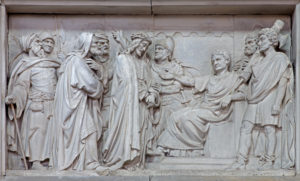As I mentioned in a prior post (Following Jesus) in the Gospel of John, the overall story of a book is really important.
In John 18, I tried to communicate the sort of message John is getting us to think through. He presents Peter as identifying with Jesus when he can be in charge and make a big display of his trust, but refuses to do so when it means identifying with Jesus as a poor, oppressed, soon-to-be-killed rebel. John is trying to get us to think through our identity in relation to Jesus.
Are we holding onto a certain vision of ourselves and trying to fit Jesus’ words into that vision, or are we sacrificing our own vision for Jesus’?
In this post I’d like to continue going through John, pointing out some of the nuances of the account, and also showing how John is assuming a narrative much larger than simply the text he is authoring.
In John’s account, after Peter’s denial, Jesus is brought to Pilate’s palace so that this Roman representative could sentence Jesus to death.
The Jewish authorities did not have permission to do this from the Roman government, so they had to go through proper channels. In the historical records available to us, it is apparent that Pilate and the Jewish leadership have a terrible relationship. They both hate one another. Pilate is in the position to hold his authority over their heads in this moment, knowing that they really want something and he is the only one that can make it happen. The bitter tone of the Jewish leadership and the arrogant-tone of Pilate is easy to miss if the reader is not familiar with the history.

After exploiting the situation at every turn to rub it in the Jewish leadership’s face that he had all the power, Pilate finally makes a decision. Do not be mistaken though, it is not because of Pilate’s goodwill. If history tells us anything about Pilate, this decision is all about that it would make mad the people he disliked the most:
“Pilate wanted to release Jesus” (19:12).
It takes a turn though, and the Jewish leadership finally has an opportunity to gain some power in this exchange, and they wield it:
“If you release this man, you aren’t a friend of the emperor! Anyone who makes himself out to be a king opposes the emperor!” (19:13).
Jesus, who is not denying that he is the Christ (which, to the original audience, reads as “the long promised Jewish king”), is a rebel. Crucifixion was reserved for such people who were opposed to the empire’s values, which is why Jesus will be put up on a cross later in this chapter. But don’t miss the assumptions in the text up to this point. Jesus is a rival king to Caesar. If Pilate has a self-proclaimed king in his district, even if that person is a poor, non-violent, disheveled carpenter, he has to act on it or it might be his own life on the line.
So, Pilate’s desire to irk the Jewish leadership is moved aside by his own self-interest. He presents Jesus to them, who has been dressed up in a purple robe and a crown, and mockingly presents to the Jewish leadership a bruised, bloody Jesus, saying:
“Here’s your king… Do you want me to crucify your king?” (19:14-15).
All of this leads up to what John puts forward as one of the most tragic statements from the Jewish leadership.
““We have no king except the Caesar,” the chief priests answered” (19:15).
John assumes we read this as the ultimate exposure of a Judaism that had been led astray by their leadership. The concept of God being the sole King of the Jewish people—and of the world, no less—is central to their cultural story.
This event had played out before. The book of 1 Samuel details the transition from the Israelites being a group of connected tribes to being united under a formal monarchy. The system they had wasn’t working, largely due to a refrain in the book of Judges,
““In those days there was no king in Israel; all the people did what was right in their own eyes” (Judges 17:6; 21:25).
The solution the people came up with, though, was not to return to their covenant vows, to recommit to the cultural charted their God had laid out for them if they wanted to prosper. Nope! This is how the book of 1 Samuel details what happens:
So all the Israelite elders got together and went to Samuel at Ramah. They said to him, “Listen. You are old now, and your sons don’t follow in your footsteps. So appoint us a king to judge us like all the other nations have.” It seemed very bad to Samuel when they said, “Give us a king to judge us,” so he prayed to Yahweh. (1 Samuel 8:4-6)
Now listen to God’s response:
“Comply with the people’s request—everything they ask of you—because they haven’t rejected you. No, they’ve rejected me as king over them. They’ve been doing to you only what they’ve been doing to me from the day I brought them out of Egypt to this very minute, abandoning me and worshiping other gods.” (8:7-8)
There are a lot of different wells to dive into from this point, but the overall point is that a central tenant of the Israelite worldview is that Yahweh was the king of the world. Hear part of Psalm 47:

This is the larger story which John assumes his readers know. He expects his readers to get to John 19:15 and be brought up into the pain of God, the tragedy of people turning away from the God that loves them. Everything they were to look to God for: peace, justice, security, etc., has been subverted with their retort to Pilate.
Perhaps on the outside they said the right things—of course they did. They led Israel’s religious life! They led the festivals and Temple activities. They “believed” all the right things, I suppose, but they had their allegiances mixed up. Caesar, he was their king, yet God, well, God presided over other sectors of life. (If we were looking at Matthew, Mark, or Luke, this would be an opportune time to understand Jesus’ comments about rendering unto Caesar and rendering unto God as a critique of this sectoring of one’s life.)
Now, back to the scene.
The tragedy of the rejection of God’s kingship in this statement is outclassed only by the larger rejection of God’s kingship that has occurred in the Jewish leadership’s rejection of the king God has sent, Jesus the Christ. As they shout “we have no king but the Caesar,” they are rejecting not just a deep theological commitment, but also the moment when God actually came to them as king in Jesus.
I will continue pressing into this scene in a subsequent blog post. But for now, be drawn into John’s narrative. God’s king, the long-promised Christ, the one who was to draw all of the creations’ woes onto himself and resolve all of the difficulties entrenched in the universe, is hanging on a cross, rejected by God’s people, abandoned by his disciples. This is the moment where Jesus is publicly proclaimed as king in this Gospel (19:20-22), yet it is also the moment where the Living Water (4:13; 7:37-38) runs out, John seems to be trying to say. “I am thirsty” (19:28), says the one who turned water to wine (2:1-11) and whose spit healed another person’s eyes (9:6-7). The revelation of God’s kingship is the revelation of God’s emptying for the world.
God comes announced not as a warrior, but as a sufferer. Not as wealthy lord, but as a dying peasant.




Ouch! Thank you for the wake up call.